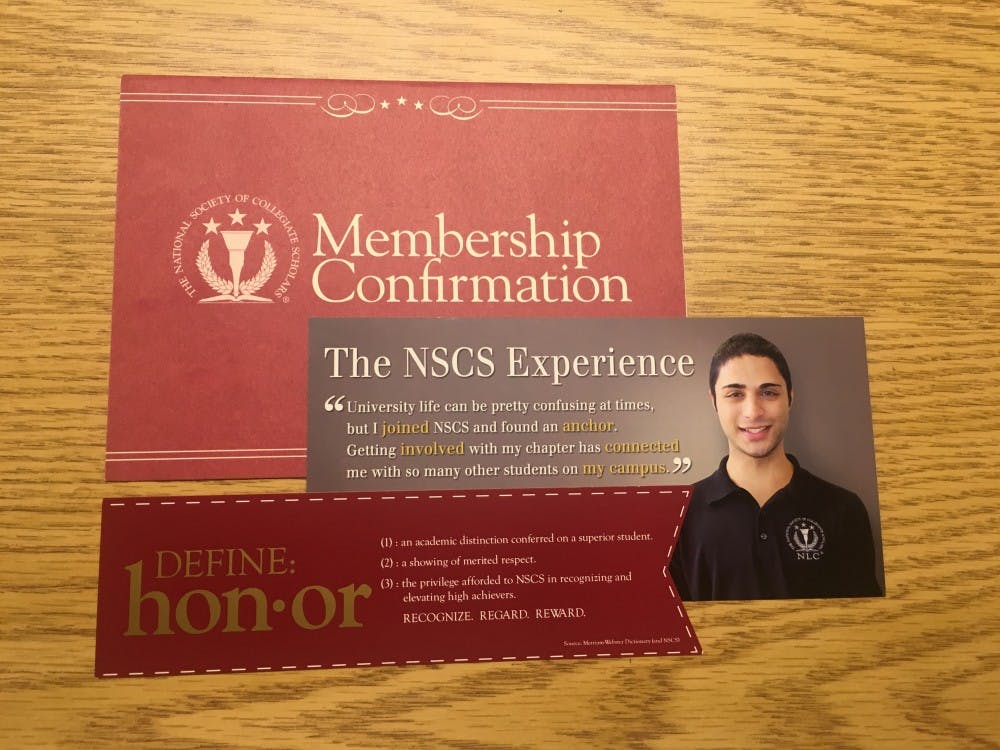After a brief hiatus, the AU chapter of the National Society of Collegiate Scholars is coming back to campus, initiated by senior and chapter president, Jon Shapiro.
Although initially founded at AU in 2005, the National Society of Collegiate Scholars has been fairly inactive on campus for the past three years due to a lack of leadership. However, after this period of inactivity, Shapiro has begun to reoperate the program, starting with an induction ceremony that took place a few weeks ago for new members.
The NSCS is an honors organization that recruits and recognizes the scholastic achievements of first and second year college students, providing them with additional scholarship and leadership opportunities throughout the rest of their college careers, according to the organization’s website. In addition to AU, George Washington University, UDC and Georgetown University also have NSCS chapters.
After hearing about NSCS from family members on other college campuses, Shapiro said he became interested in its mission and began the process of revamping AU’s chapter last spring, which now has approximately 100 members.
“Primarily to students it serves two things,” Shapiro said. “One, it’s a scholarship aggregator and they give out about $1 million a year to their members. But the other thing, and their big focus is on giving back and on community service.”
NSCS also sponsors the Planning to Achieve College Excellence (PACE) program, which encourages college students to partner with local schools and increase the likelihood of getting those students to graduate high school. According to Shapiro, the chapter has not yet selected a school to partner with for this program.
“They have this program called PACE which is designed to help younger students, typically middle school and early high school as well, to get them to want to go to college and to tutor them or whatever might be necessary to make that a reality and possible,” Shapiro said. “I think that’s a very worthwhile cause and so I wanted to bring that to campus.”
As a nationwide organization that is currently active at over 330 campuses within the U.S., students are recruited based on two main factors: grades and academic record, according to the website.
Additionally, the society focuses on three main pillars: Scholarship, leadership and community.
“The main thing is we want you to have a 3.4 GPA at the end of your first or second year. That’s sort of the biggest test,” Shapiro said. “Then there are also requirements that student activities pose. Don’t have any current conduct violations for example. But [GPA] is the main one that determines most things.”
While NSCS is certified by the Association of College Honor Societies, its $95 membership fee made some students including School of Public Affairs sophomore Cali Bronkema question its legitimacy after receiving a letter from them in the mail, despite its perks of offering participants a variety of scholarship opportunites.
“I think it was the membership fee in addition to the whole thing seeming impersonal,” Bronkema said. “Just that in it seemed like a very standard letter, and the perks of it seemed like something I could achieve without having to pay the money. But the membership fee definitely came off as a red flag.”
Shapiro said while the membership fee, in addition to the similarity of NSCS’ name with a different organization (the National Society of High School Scholars), may make the organization come off as a type of scam, it is set by the national office and the money distribution goes toward legitimate causes such as a processing fee, marketing materials and the salaries of NSCS employees.
“The main problem is there is a high school honors society that has an incredible similar name by unfortunate coincidence which is mostly a scam,” Shapiro said. “This is not. What I usually tell people is ‘Hello. I am here. I am a real person. I attend this school,’ and then I also say something about what we do, what we aim to be doing, and that we’re not just that organization that you’re familiar with in high school.”
Given that the club has just begun to meet, kicking-off with their recent induction ceremony, Shapiro said executive board members have yet to determine if there will be additional requirements which must be fulfilled after induction, such as volunteer hours or attending meetings.
“We’re very new so in a sense, we’re also still deciding on an identity,” Shapiro said. “My vision, which I can’t guarantee is what happens, is that it’s sort of a ‘you get what you put in.’ If you want opportunities, if you want access to all of the scholarships that they offer, you have to put in the work. If you just want a resume item, that’s cool, too.”





